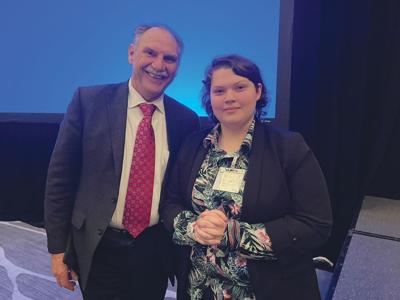April is Autism Acceptance Month, an initiative created by the Autism Society to promote awareness around the neurodevelopmental disorder. Accepting her autism is something that Jovie Talbott has certainly been able to do.
Talbott and 15 others shared their stories and gave recommendations to Tennessee legislators earlier this month as part of a program called Our Stories. The Down Syndrome Association of Middle Tennessee and Autism Tennessee partnered on a grant from the Tennessee Disability Coalition to create the program and provide four weeks of training to help people with one or both conditions, some with their families, learn about self-advocacy and share what they have to say in print and video form.
Talbott uses the term autistic to describe herself, and sees the condition as something inextricable from who she is as a person. The focus of the story she created through Our Stories is the public education system. Even with what’s known as an individualized education program, she found teachers didn’t understand her accommodations, and she eventually transferred to a private school as a result.
Talbott, who was in school in Wilson County, says she often ended up in in-school suspension, and was known as a “problem kid” because of frequent meltdowns. She’d like to see students have access to quiet rooms with things like noise-canceling headphones and fidget toys to help them calm down when they get overwhelmed. Talbott also recommends more training for educators on teaching kids with autism, and more staff to allow for one-on-one attention.
“I definitely feel like I was having these daily meltdowns because the school did not know how to treat me,” Talbott says. “I was isolated from a lot of my peers. I used to be good friends with my neighbor, but because I had meltdowns constantly she ended up being scared of me and didn’t want to hang out with me anymore. And the thing is, I know I wouldn’t have been having those daily meltdowns if I had just been accommodated for.”
Now 16 years old, Talbott also serves as an advocate for those who were diagnosed later in life — she was diagnosed with autism at age 12, while diagnoses for some children arrive as early as 2 years old.
“When [children with autism] fly under that radar and they’re not diagnosed until a later age, they end up in situations where they’re being labeled as misbehaving or the problem kids or the behavior challenges,” says Jessica Moore, interim executive director of Autism Tennessee.
Presentations from the cohort touched on subjects including support for adult children in the event of divorce, employment opportunities, care for mental health, social security benefits for autistic adults, access to Section 8 housing, and reliable public transportation and safe walking for those who cannot drive.
“The level of self-confidence that they gained from Session 1 through the actual filming process was just amazing,” Moore says. “Just their self-confidence, just that boost and being able to know that people care, people want to hear their stories, that they’re doing something that not only could positively impact their own lives, but impact the lives of other people with disabilities.”
Alecia Talbott is the executive director of the Down Syndrome Association of Middle Tennessee — she’s also Jovie’s mother and the program’s videographer. She hopes the Our Stories presentations will push legislators to use their power to cut bureaucracy when it comes to getting services for people with disabilities.
“It’s so frustrating, and a lot of people give up and don’t get the help that they really need and deserve and is available to them, because the systems are so complex and fraught with bureaucracy,” Alecia Talbott says. “It’s almost set up as if we’re all trying to scam the system in a lot of ways. It makes it much harder.”
In 2021, the Autism Society of America formally announced a shift from Autism Awareness Month to Autism Acceptance Month, hoping to see those with autism more accepted and integrated into everyday society. It’s also something Jovie Talbott hopes will be true for others with similar struggles.
“I think it was very important to be able to actively speak for myself,” Jovie Talbott says. “My community has historically been a group that has been spoken over. And I think in this day and age, it is time to just hand us the microphone and let us speak for ourselves for once.”





